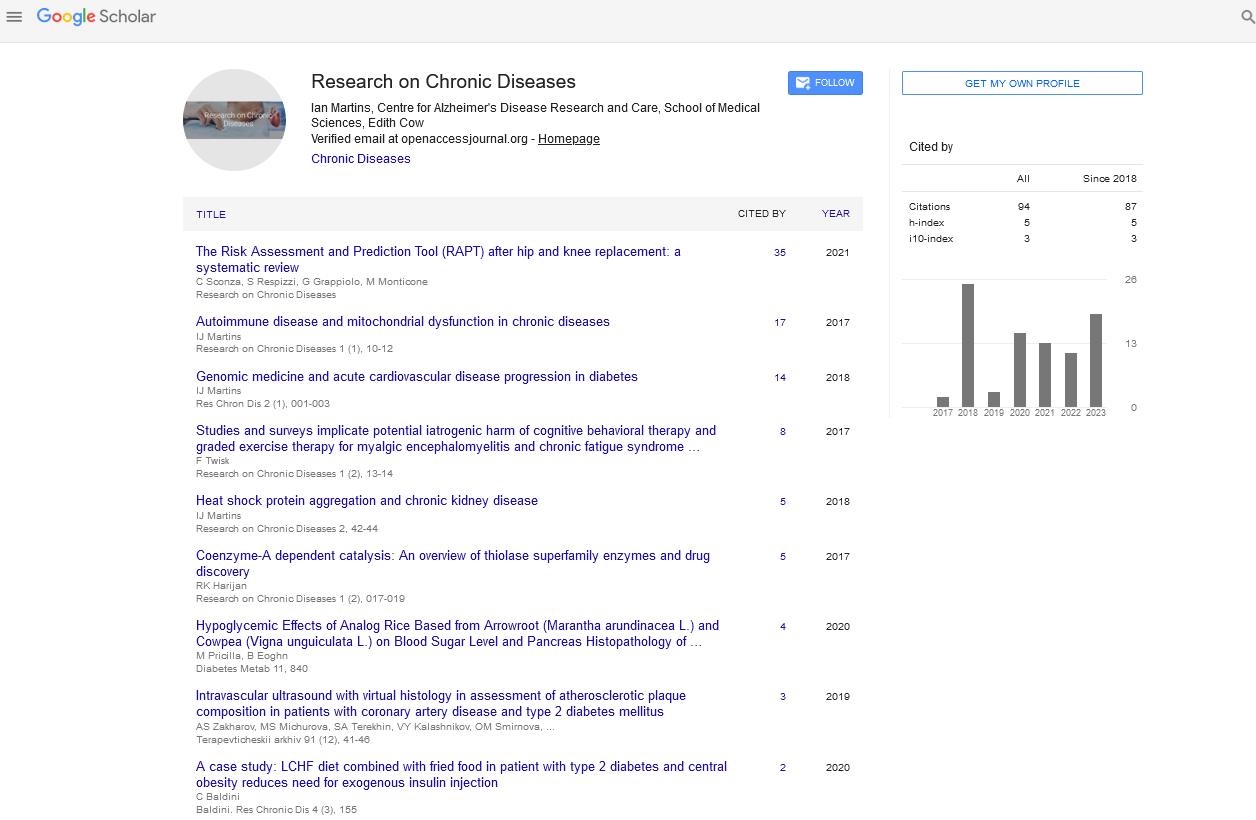Perspective - Research on Chronic Diseases (2023) Volume 7, Issue 6
Navigating the Landscape of Hormonal Disorders: Understanding, Managing, and Finding Balance
- Corresponding Author:
- Guy de La Rosa
Department of Transplant Medicine, University of Ghana, Accra, Ghana
E-mail: Larosa1234@enanta.com
Received: 08-Nov-2023, Manuscript No. OARCD-23-119482; Editor assigned: 10-Nov-2023, PreQC No. OARCD-23-119482 (PQ); Reviewed: 24-Nov-2023, QC No. OARCD-23-119482; Revised: 01-Dec-2023, Manuscript No. OARCD-23-119482 (R); Published: 08-Dec-2023, DOI: 10.37532/OARCD.2023.7(6).123-124
Introduction
Hormones, the body’s chemical messengers, wield a remarkable influence over nearly every physiological process, from metabolism and growth to mood regulation and reproductive functions. The delicate balance of these hormones is vital for overall health and well-being. However, when this balance is disrupted, it can lead to hormonal disorders, causing a myriad of symptoms and complications. Understanding these disorders, their impact, and the management strategies is crucial for maintaining a healthy life.
Exploring hormonal disorders
Hormonal disorders are conditions that arise from an imbalance or dysfunction in the body’s endocrine system, which is responsible for hormone production and regulation. This imbalance can manifest in various ways and affect multiple bodily functions. Several prevalent hormonal disorders encompass:
• Diabetes: A well-known hormonal disorder, diabetes occurs when the body can’t properly
regulate blood sugar (glucose). It includes type 1 diabetes, an autoimmune condition that
affects insulin production, and type 2 diabetes, where the body becomes insulin resistant.
• Thyroid disorders: Conditions like hypothyroidism (underactive thyroid) and hyperthyroidism
(overactive thyroid) stem from imbalances in thyroid hormone production, impacting
metabolism, energy levels, and weight.
• Polycystic Ovary Syndrome (PCOS): Common in women of reproductive age, PCOS
involves hormonal imbalances leading to irregular periods, excess androgen levels, and the
development of cysts on the ovaries, impacting fertility and metabolic health.
• Adrenal disorders: Conditions like Cushing’s syndrome or Addison’s disease stem from
irregularities in adrenal hormone production, impacting metabolism, stress response, and
blood pressure regulation.
Recognizing symptoms and underlying causes
Hormonal disorders present a wide array of symptoms, often overlapping with other conditions, making diagnosis and management complex. The symptoms can range from subtle to severe and may include:
• Sudden weight changes.
• Fatigue and energy fluctuations.
• Mood swings or emotional disturbances.
• Irregular menstruation or fertility issues.
• Skin changes and hair loss.
• Digestive issues and metabolic irregularities.
Identifying the root cause of hormonal imbalances often involves a combination of comprehensive medical history, physical examinations, and various diagnostic tests such as blood tests, imaging studies, and hormone level assessments.
Description
Impact on daily life and well-being
The impact of hormonal disorders extends beyond physical symptoms, significantly affecting an individual’s overall well-being. These conditions can disrupt daily routines, diminish quality of life, and pose mental and emotional challenges.
The struggle with unpredictable symptoms can lead to increased stress, anxiety, and depression. Hormonal imbalances might affect relationships, self-esteem, and daily productivity, leading to a considerable emotional toll on individuals dealing with these conditions.
Management and treatment approaches
Management strategies for hormonal disorders often involve a multidisciplinary approach, tailored to the specific condition and its severity. Treatments aim to restore hormonal balance, manage symptoms, and improve overall quality of life.
• Medications: Depending on the disorder,
medications may be prescribed to either
supplement or block certain hormones,
aiding in balancing levels and managing
symptoms.
• Lifestyle modifications: Dietary changes,
regular exercise, stress management
techniques, and adequate sleep play a pivotal
role in managing hormonal imbalances.
• Hormone Replacement Therapy (HRT): In some cases, HRT may be recommended
to restore hormone levels, especially
in conditions like hypothyroidism or
menopause.
• Surgical interventions: Surgical procedures
may be necessary in cases such as removing
tumors causing hormonal imbalances or
procedures like thyroidectomy in specific
thyroid conditions.
The role of prevention and self-care
Prevention and self-care play a vital role in managing and potentially preventing hormonal imbalances. Prioritizing a healthy lifestyle that includes a balanced diet, regular exercise, stress management, and adequate sleep can significantly contribute to hormonal balance and overall well-being.
Regular health check-ups and maintaining open communication with healthcare providers are crucial for early detection and intervention, reducing the impact of potential hormonal disorders.
Ongoing research and promising developments
Research in endocrinology continues to advance, offering hope for better understanding and management of hormonal disorders. Innovations in treatments, including the development of more targeted medications, advanced diagnostic tools, and genetic studies, aim to improve diagnosis accuracy and treatment efficacy.
Furthermore, the integration of technology and artificial intelligence in healthcare promises more precise and individualized treatment plans for patients dealing with hormonal disorders, ensuring a more tailored and effective approach to managing these conditions.
Conclusion
Hormonal disorders present a complex landscape of conditions that significantly impact an individual’s physical, emotional, and mental well-being. Understanding the symptoms, causes, and management strategies is crucial for those affected and their caregivers.
While navigating the intricacies of hormonal disorders may pose challenges, early detection, and a multidisciplinary approach to treatment, lifestyle modifications, and ongoing research offer hope for better management and improved quality of life for those affected by these conditions. Ultimately, awareness, education, and proactive health measures are key in addressing hormonal imbalances, promoting overall health, and fostering a better quality of life for individuals affected by these disorders.
